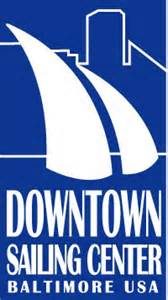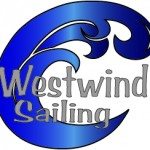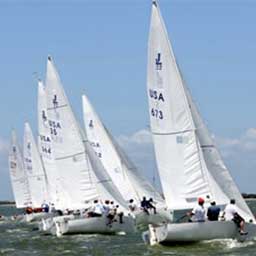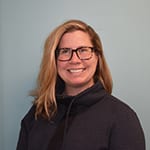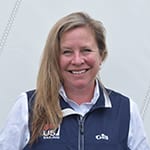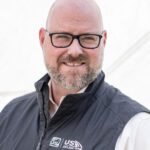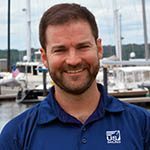How to Start a REACH Program
Cindy Nickerson, Executive Director of New England Science and Sailing in Stonington, Connecticut
Getting Started with REACH
Thinking of starting US Sailing’s STEM Education Program, Reach, but don’t know quite where to start? As a community sailing center or yacht club with a junior sailing program, you already have the basic infrastructure needed for the REACH Program, and getting started is easier than you think. Over 200 organizations around the globe have already taught Reach to thousands of children in four countries. Read on to learn how you too can get started.
What is REACH?
US Sailing’s REACH Program combines STEM (Science, Technology, Engineering, and Math) with the sport of sailing for a fun, effective learning experience. Reach challenges students to reach higher academically, reach further personally, and reach deeper into the depths of science and technology. From an organizational view REACH provides sailing centers with an opportunity to create diversity within the sport, to partner with schools and offer the resources many teachers can only wish for a hands-on wet science lab, boats docks, and the great outdoors, and the opportunity to remove barriers to local waterways for your community.
The Reach curriculum currently consists of ten modules – or lesson plans – covering different topics related to some aspect of sailing. Reach uses sailing as the platform to 1) teach STEM concepts, making traditionally dry, academic subjects relevant and fun, and 2) connect students with the environment, fostering life-long stewardship. Developed by a team of experts from multiple disciplines and backgrounds the modules expertly guide instructors through each lesson plan. The REACH Student Logbook & Portfolio is the perfect way for students to follow along, collect data, and reflect on their learning throughout the modules.
Why Sailing?
As an adventure activity, sailing forces students out of their comfort zones and out from behind their desks (and screens). Sailing is more than just hands-on; it’s a full body, multi-sensory experience. “Adventure Education: Theory and Applications” by Prouty, Panicucci, and Collinson defines adventure education as “direct, active, and engaging learning experiences that involve the whole person and have real consequences.” These authors see adventure education as “a major educational trend” because it heightens learning and yields outcomes such as personal growth. Sailing gives students experiences they just can’t get on a field, diamond, or court, which makes it a natural partner for STEM education and an effective supplement to traditional education.
“STEM is the Way: The terrain in our country has changed from production-based economy to a consumption-based economy (A ‘sailboat’ is the world’s best science ‘wet lab’) as community sailing centers are able to engage the application of (US Sailing’s Reach) STEM education and partner with public school systems they will make sailing relevant again. The list is endless… It also allows us to take sailing to a whole new generation of sailors of diverse backgrounds that we aren’t serving today.” according to Lou Sandoval Co-Owner of Karma Yachts, one of the Top 5 takeaway’s from the US Sailing Leadership Forum is STEM, see more at A Funny Thing Happened on the way to the Airport.
Why Reach?
Different organizations have different reasons for implementing the Reach program into their course/program offerings. Many community sailing centers find it meshes nicely with their educational mission and gives them a new way to serve their communities. Yacht clubs may find that fun, STEM-based classes give them a new way to serve their member kids who might not be interested in traditional sailing and racing classes (at least not until they’ve taken a Reach class). Check out “Why STEM?” by Executive Director of Community Boating Center, John O’Flaherty
What do I need for Reach?
As a community sailing center or yacht club with a junior sailing program, you already have the basic infrastructure needed for the Reach Program: kids, boats, a place to sail, and US Sailing certified level 1 small boat instructors or keel boat instructors. All you need is the STEM Educator Guide which includes lesson plans, some basic class materials, and interested individuals who can teach the program. Getting the lesson plans is easy – just buy the STEM Educator Guide – and many of the class materials are readily available or easily obtainable. The cost for materials is about $500 for 50 students for all 10 modules. The toughest part will be finding people to teach the modules, and even this doesn’t have to be difficult. Your sailing community likely already has teachers, scientists, engineers, sailing instructors, and active parents who could teach Reach. If they want more direction, send them to US Sailing’s STEM Educator Course, or host one yourself.
Also remember the Reach modules are excellent guides or templates – it’s not necessary to follow them strictly. Feel free to pick and choose what you want to cover. Most organizations implementing REACH customize the lesson plans at least a little to suit their own students and organizational partnership needs.
What about funding?
All of this programming isn’t cheap, so charge for it, and make the case for your program in your marketing pitch. If your students can’t afford the program, you’ll have to fundraise, either through grants from corporations and foundations or gifts from individual donors. Do your homework to know your local community and which organizations are likely to support your efforts. Beyond programming, students may have additional costs (transportation and gear, for example), so remember these in your fundraising plans. US Sailing offers annual Reach grants and lists other resources for programs.
What is the long-term Reach plan?
Ideally, US Sailing would like to see sailing centers forming coalitions. In other words, we are challenging sailing centers to joining together with local schools, universities, outreach/ after school programming, and local STEM industries to mentor students through project based learning, while exposing them to the sport of sailing and exposing them to local STEM based careers.
Steps to implementing REACH:
- Find a champion (you?!) in your organization who can advocate for and implement Reach.
- Purchase the STEM Educator Guide, which contains detailed lesson plans and a treasure trove of helpful information on partners, resources, and class materials.
- Identify a Reach instructor and give them the training and tools they need to be successful. Send your instructor to a STEM Educator course, or host one yourself. Retired teachers can be a great resource.
- Partner with schools and youth organizations in your area. Download the School & Youth Program Partnership Guide
- Market and implement your classes – take pictures and share them on social media.
- Solicit feedback from students, parents, and instructors.
- Visit the Reach website www.ussailing.org/education/youth/reach for more information.
- Contact US Sailing for information and advice Reach@ussailing.org.
Testimonials
Chelsea Petrais of Community Boating Inc – kids in attendance began to ask more science based questions
“The Reach Initiative at Community Boating Inc. has made a positive impact among the youth in Community Boating’s junior program. Throughout the summer, I noticed how those in attendance became more aware of their environment and became more passionate about the sailing world. I believe this was due to the activities included in the reach curriculum that gave the kids real world and tangible experiences. The effect of the program became apparent when the kids in attendance began to ask more science based questions and their creativity in projects increased. The Reach program has become a staple at CBI where the kids genuinely look forward to learning and have taken on a new perspective in their immediate environment and the sailing world.”
Chelsea Petrais
Environmental Science Coordinator
Community Boating Inc.
Boston, MA
Stuart Proctor of Downtown Sailing Center – Baltimore, MD
“The two mentoring sessions held at Community Boating Center, the Reach IT training, and the STEM Program Quality Assessment (PQA) evaluations have been critical in helping us up our game at the Downtown Sailing Center. We’ve got a long way to go but we’re off on the correct foot! Keep up your great work and know it’s making an impact!”
Stuart Proctor
Programs and Education Manager
Downtown Sailing Center
Westwind Sailing Executive Director Diane Wenzel – Dana Point, CA
Diane Wenzel
Executive Director
Westwind Sailing
Dana Point, California
Community Boating Center Provides Unique Pathway to Maritime Career – Student Testimonial
“This is where is all started – the Community Boating Center of Providence. Just a 13 year old kid who’s grandma forced him to go to a summer sailing camp. I remember it like it was yesterday, I hated the first week! But as time went on I started to like the idea of sailing. The following summer I was asked to be a junior instructor. This only led me to love the idea of passing what you know on to the young. When I was 16 they presented me with an opportunity – An opportunity which has changed my life forever. They offered me a sailing instructor position. I learned a lot about myself in the years I was a sailing instructor. I learned from the children who I was instructing. Over time CBC started to trust me not only with the children but they also taught me how to maintain sailboats and from that they taught me how to repair them. There it was, my eyes opened up to a whole new world. My life has had it’s moments but when I’m sailing nothing else matters, I forget about the world, I am stress free and truly happy. With my love for sailing growing everyday I am proud to say that on the 17th of March I will be starting my first full time job at the Martha’s Vineyard Shipyard as one of their riggers. I would like to thank CBC for everything they have taught me and also my family for always being there for me. I am one step closer to my goal.” – Anthony CBC prior student
Community Boating Center: Science and Special Education Teacher
“The Community Boating Center has offered my students an opportunity to participate in US Sailing’s Reach program, which has facilitated project based-learning and provided students outdoor opportunities that they otherwise would not be able to enjoy. The students have participated in a number of activities from giving back to their community by picking up debris along the Providence Harbor and exploring water quality and ecology. They have enjoyed being a part of the Reach program, which fosters leadership and passion for being on the water!”
– Musheng Alishahi, Village Green Charter School, Science and Special Education Teacher
Community Boating Center partners with several schools when implementing Reach, below is a testimonial provided by a teacher from Village Green Virtual Charter School. They will partner with CBC again this coming spring for their third Reach Program at CBC. Village Green serves students from across the state of Rhode Island.
“We need to teach students how to solve problems…” – Katie Schlotterbeck, middle school science teacher
“The Reach curriculum is very flexible. It’s also easy to teach. You don’t have to make the topics exciting – they’re already exciting for students. I like that the modules are inquiry based. Too many times, students are given a set of directions to follow. I like to say, Here’s the question, now how can you solve it? They’ll draw, test, and come back to the drawing board until they get their answer. We need to teach students how to solve problems, not just how to follow directions.” – Katie Schlotterbeck
Katie Schlotterbeck is a middle-school science teacher at St. Michael Lutheran, a National Blue Ribbon School in Fort Myers, Florida. Katie was part of the five-site pilot Reach pilot program in 2012 and continues to implement Reach as a partner of the Edison Sailing Center.
Edison Sailing Center
Fort Myers, Florida



